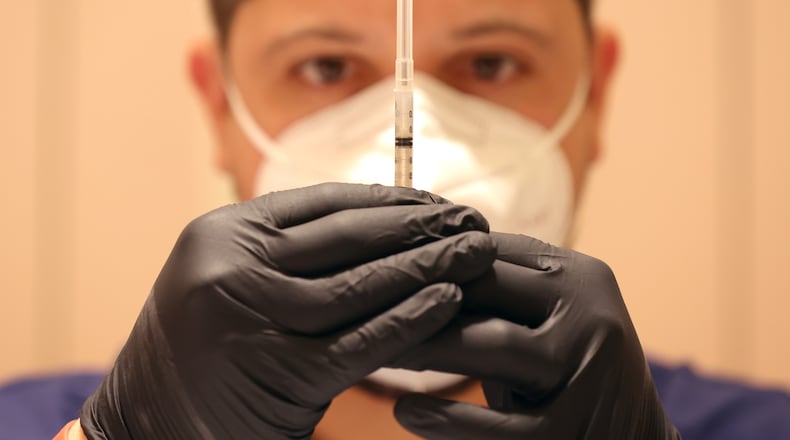In the quest to design a better COVID-19 vaccine, scientists are attempting to hit a moving target.
Vaccine researchers are working to reformulate the existing vaccines to be effective against variants that have yet to emerge, while taking into account how quickly the coronavirus can mutate.
Health experts from across the country are optimistic that better vaccines can be achieved and be potentially ready to administer by the fall — before holidays and flu season converge. Scientists will not only have to predict the future with the vaccine’s formula, they’ll also have to convince the public to get yet another shot.
“I think experiments will produce stronger vaccines that can handle more changes,” Dr. Arthur Caplan, a professor of bioethics and head of the division of medical ethics at New York University School of Medicine, told The Atlanta Journal-Constitution. “They may not get all of them, but they’ll do better. That probably means an annual shot.”
It’s likely COVID vaccines are heading the same way as flu vaccines, where people take annual shots reformulated each year against the most likely strains. However, that strategy only works if people take them, and vaccine experts seem more dour about that prospect as vaccination percentages struggle to increase.
“A vaccine dose that remains in the vial is 0% effective no matter what the clinical trial showed,” Dr. Walter Orenstein, a former director at the Center for Disease Control and Prevention’s immunization program and a professor at the Emory Vaccine Center, said.
Two years after COVID vaccines started going into arms, they are still highly protective in warding off severe disease and hospitalization. Even so, the protection offered by COVID vaccines has been found to wane within a few months. According to the CDC, COVID vaccines are 91% effective in preventing hospitalization during the first two months but drop to 78% after four months. Booster shots were cleared by the FDA to extend the protection, but vaccine experts say the prospect of taking a booster two or more times a year will be challenging.
“It’s not a feasible strategy,” said Dr. Glen Nowak, a UGA professor and expert in public health communications who spent 14 years at the CDC. “We haven’t convinced many people that they should get one additional dose of the vaccine.”
Vaccine experts said that any new vaccines that hit the market will need to require less frequent booster shots or tackle multiple viruses at the same time to gain traction among an increasingly shot-resistant country. Scientists said those are tall tasks to accomplish, especially as the coronavirus continues to mutate at a rapid pace.
Ongoing research
Today’s COVID vaccines are all based on the original version of the coronavirus.
However, the delta and omicron variants led to more breakthrough cases among vaccinated populations, expediting the need for new and improved vaccines.
“That first omicron variant reminded everybody that you better keep doing research because this virus changes,” Caplan said.
On Tuesday, Moderna announced that an updated version of its vaccine based on one of the coronavirus’ first mutations, the beta strain, was able to produce more antibodies capable of fighting several variants — including omicron — than today’s booster shots.
Georgians are helping with that research. Dr. Lilly Immergluck, a vaccine trial unit co-director at Morehouse School of Medicine, is leading a clinical trial using updated versions of Moderna’s vaccine. She said they’re testing six different vaccines based on coronavirus variants, including beta, delta and omicron, to see how effective they are at preventing infection and serious illness over the next year.
Morehouse School of Medicine is among 24 sites across the U.S. participating in the clinical trial, and they’re recruiting participants through early May.
Dr. Baozhong Wang, a professor at Georgia State’s Institute for Biomedical Sciences, said updated vaccines are within the reach of modern science and can be ready by the end of this year.
“The true issue will be determining what strains should be used as templates for updating the coronavirus booster shots — a perennial problem for the seasonal influenza vaccine.,” Wang said in an email.
Getting more shots in arms
A new and even more effective vaccine doesn’t solve a key obstacle: Not enough people are getting vaccinated.
“I don’t think (vaccine hesitancy) is going to disappear. It’s very entrenched, so that’s why I don’t think you can vaccinate your way out of COVID,” Caplan said.
Currently, 56% of Georgians are fully vaccinated, but that number has remained stagnant for the past few months. It took from February 7 to April 7 for the state to increase a single percentile.
Given that only 55% of Americans received their flu vaccine this past winter, annual shots might not be a long-term solution for country-wide immunity. Vaccine developers are searching for a one-shot solution to potentially address that issue, but it would be an unprecedented medical discovery. Caplan said the challenge could be similar to that of developing a vaccine for HIV, which has eluded scientists due to the virus’s quick mutations.
The ability for people to become reinfected with COVID, just like the flu, means it’s a completely different situation from developing the vaccines that nearly eradicated measles and polio, Orenstein said.
Many types of vaccines, called mRNA vaccines, target the virus’ spike protein, which is how viruses enter and infect human cells. The spike protein for measles and polio doesn’t change, allowing for vaccines to provide lifelong protection.
The flu and coronaviruses have spike proteins that mutate often, requiring reformulated vaccines and multiple shots.
There are scientific studies underway searching for a pan-coronavirus vaccine, sometimes called a universal vaccine, which would provide long-term protection against COVID and its variants. But those efforts have been attempted with the flu for decades and have yet to yield a miracle shot.
“To do better than Mother Nature is a challenge,” Orenstein said.
About the Author
The Latest
Featured



